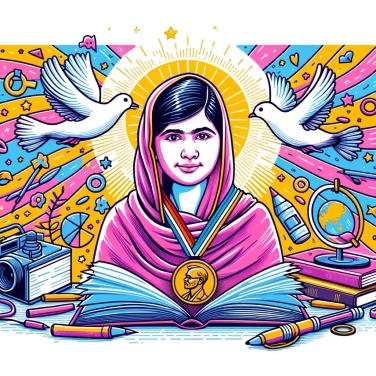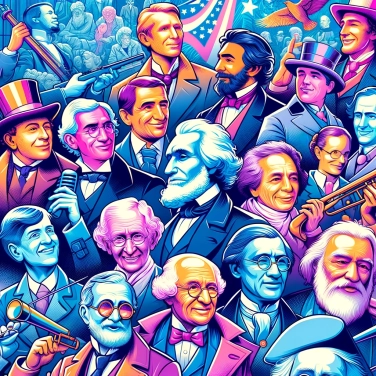Malala Yousafzai received the Nobel Peace Prize at the age of 17 for her commitment to girls' education and their right to education, as well as her fight against the oppression of children and young people worldwide.

Since she was very young, Malala has been denouncing the inequalities in access to education in her region of Pakistan, where the Taliban severely prohibit girls from attending school. She begins to speak out publicly at just 11 years old, notably through an anonymous blog on the BBC, in which she shares her daily life under the Taliban regime and passionately advocates for girls' education. Very quickly, her voice finds a powerful international resonance, inspiring other young girls around the world to claim their fundamental right to learn. Despite the threats and hostility from local extremists, she never gives up her fight for every girl to be able to go to school freely.
While she was still a teenager, Malala dared to publicly defy the Taliban, who banned girls from going to school. Despite death threats, she continues to speak out, advocating for girls' fundamental right to education. In 2012, at just 15 years old, she was the victim of a armed attack by the Taliban, shot in the head. Far from being intimidated, Malala survives, quickly resumes her fight, and becomes a powerful symbol of resistance against violent extremism. Her courage allows her to draw the world's attention to the violence and injustices faced by girls under the oppressive regime of the Taliban.
Malala's fight quickly transcended the borders of Pakistan, inspiring millions of people around the world. Her story, and especially her courage in the face of violence, turned this Pakistani teenager into a global symbol of girls' right to education. After surviving the Taliban attack, Malala became an international figure, invited to important summits and major political meetings. She spoke before the United Nations, meeting heads of state and celebrities who amplified and relayed her message. Thanks to her, several countries have taken clearer positions in favor of girls' education, launching or strengthening international programs for it. Her influence has generated immense mobilization around the right to education, placing this issue on the most important global agendas. Many young people around the world see her today as a model of determination and civic engagement.
From the outset, Malala clearly chose to advocate for her ideas through speech rather than through weapons. Even after the violent attack she endured, she remains true to a simple yet powerful message: change must come through dialogue and not through violence. Her deep conviction is that only peace will lead to lasting justice. When she speaks publicly, she always emphasizes two things: the power of education and the effectiveness of non-violence. Her speech resonates because it is sincere, calm, and courageous, calling for countering hatred with understanding and violence with empathy. For Malala, responding to aggression with even more violence will never bring about a real solution.
At just 17 years old, Malala Yousafzai became in 2014 the youngest laureate of the Nobel Peace Prize, drawing massive international attention to her fight for girls' education. She also received the prestigious Sakharov Prize from the European Parliament, a strong symbol of freedom of thought and human rights. TIME magazine named her one of the most influential people in the world, and her biography "I Am Malala" became a global bestseller, published in dozens of languages. International leaders, celebrities, and humanitarian organizations publicly support her efforts, making her a universal icon of hope and peaceful change.
Malala delivered her first public speech at just 11 years old, already denouncing the Taliban's repression of girls' education in her region of Pakistan.
To raise awareness about the plight of girls deprived of education, the UN declared July 12, Malala's birthday, as 'Malala Day.'
Despite her worldwide fame, Malala is actively continuing her studies: she earned a degree in Philosophy, Politics, and Economics from the University of Oxford.
She has an asteroid named in her honor: asteroid 316201 Malala, in symbolic recognition of her contribution to education for all.
At just 11 years old, Malala maintained a blog under a pseudonym for the BBC, where she described her daily life under the Taliban regime in Pakistan, courageously denouncing the school bans affecting girls and advocating for their fundamental right to education.
Through her activism, personal journey, and international recognition, Malala has raised global awareness about the cause of women's education and inspired millions of young girls to claim their right to learn.
Malala's fundamental principles are non-violence, dialogue, social justice, and universal access to education as a lever for social change.
Malala emphasizes that educating girls enables the economic, social, and cultural empowerment of women while contributing to the overall development of communities and reducing poverty worldwide.
Malala continues her efforts through the Malala Fund, her foundation that advocates for and finances educational projects to give girls around the world the opportunity to access free, safe, and quality education.
For Malala, this award is a global recognition of children's rights, particularly girls', to education. It has brought powerful visibility to her peaceful struggle against oppression and has amplified her voice to call for tangible changes around the world.

20% of respondents passed this quiz completely!
Question 1/6